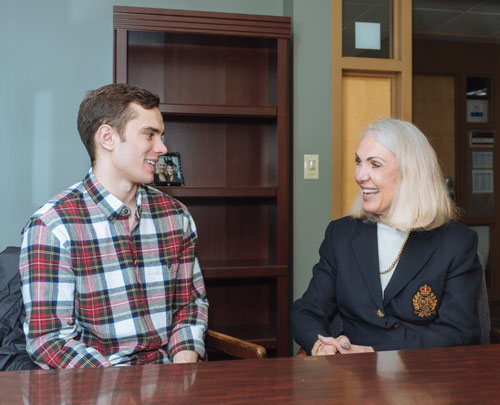Helzberg School of Management
An Emotional Impact

In 1981, Anna “Acey” Lampe took a job at Hallmark. She worked there for more than 20 years, holding various positions in public affairs and communications, market research and market strategy. She contributed to Hallmark’s growth and expansion and likewise, Hallmark contributed to hers.
One person, in fact, especially inspired and encouraged Lampe: Jay Dittmann.
Dittmann, at the time Director and Team Leader in Business Process Reengineering, was a peer of Lampe’s at Hallmark. Dittmann’s extraordinary skill in the way he led and motivated those he supervised quickly became apparent to Lampe.
“I saw the negative impact that managers with low emotional intelligence had on their staff. I also saw the power of managers who had high emotional intelligence and the positive impact it had on staff productivity,” recalls Lampe.
Dr. Dittmann demonstrated to Acey and her colleagues the power of being skilled in more ways than just content expertise or management know-how. Though Lampe was not familiar with emotional intelligence at the time, she recognized that Dr. Dittmann had something that made him more present with his own emotions and more aware of the emotions of those around him – something that made him indelibly more trustworthy and easy to work with.
What Dr. Dittmann had didn’t cause him to treat people the same, rather, it ensured that he was in tune with each person’s differences so that each staff member was treated according to their strengths and weaknesses. The result was that Acey and her colleagues wanted to work for him.
“He had a way of making everyone feel important and special and it had nothing to do with your level in the company,” said Lampe.
Dr. Lampe eventually left Hallmark to take a teaching position at Rockhurst University, where she has taught for 12 years, rising to the position of executive assistant professor of management. Here, her research interests have followed the impact of Dr. Dittmann.
At first, she didn’t have a name for what made Dr. Dittmann so successful in nurturing and empowering those who worked for him. Eventually, she would learn that his success could be attributed to something called emotional intelligence.
In 2010, Dr. Lampe presented research on the Myers-Briggs personality assessment as used in the workplace at the Advances in Business Research Conference. At the conference, Dr. Barbara Burgess-Wilkerson of Winthrop University was presenting on the, then, still new idea of emotional intelligence (EI). After watching Dr. Burgess-Wilkerson’s presentation, Dr. Lampe was fascinated, curious and hooked. She sought Dr. Burgess-Wilkerson out and the two from then on were bound to collaborate.
Burgess-Wilkerson and Lampe eventually co-authored two studies, one of them a validation of an EI instrument that Dr. Burgess-Wilkerson created (the Wilkerson Emotional Intelligence Test for Academics and Careers - WEITAC). Following their research around the importance of EI for success in the workplace, Lampe won a university grant to write curriculum so that EI could become a permanent component of the undergraduate curriculum in the Helzberg School of Management
Lampe was thrilled for the opportunity to infuse the undergraduate curriculum with EI instruction.
“If we can teach students how to be more emotionally intelligent and give them one or two things to work on, before we know it, they’re a different human being,” said Lampe.
Later this year, Lampe, will set up a permanent residence on the West Coast. Though her physical presence on campus will be sorely missed by both faculty and students, she’ll continue to positively impact students at the Helzberg School of Management as she teaches online courses. Faculty, staff and students at the Helzberg School of Management are forever grateful for the way Dr. Lampe has cared for students and contributed her expertise in EI, management and marketing.








